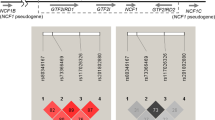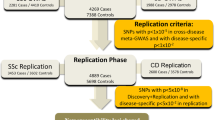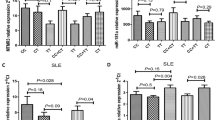Abstract
We reported earlier that two mitochondrial gene polymorphisms, UCP2 –866 G/A (rs659366) and mtDNA nt13708 G/A (rs28359178), are associated with multiple sclerosis (MS). Here we aim to investigate whether these functional polymorphisms contribute to other eight chronic inflammatory diseases, including rheumatoid arthritis (RA), systemic lupus erythematosus (SLE), Wegener' granulomatosis (WG), Churg–Strauss syndrome (CSS), Crohn's disease (CD), ulcerative colitis (UC), primary sclerosing cholangitis (PSC) and psoriasis. Compared with individual control panels, the UCP2 –866 G/A polymorphism was associated with RA and SLE, and the mtDNA nt13708 G/A polymorphism with RA. Compared with combined controls, the UCP2 –866 G/A polymorphism was associated with SLE, WG, CD and UC. When all eight disease panels and the original MS panel were combined in a meta-analysis, the UCP2 was associated with chronic inflammatory diseases in terms of either alleles (odds ratio (OR)=0.91, 95% confidence interval (95% CI): 0.86–0.96), P=0.0003) or genotypes (OR=0.88, (95% CI: 0.82–0.95), P=0.0008), with the –866A allele associated with a decreased risk to diseases. As the −866A allele increases gene expression, our findings suggest a protective role of the UCP2 protein in chronic inflammatory diseases.
This is a preview of subscription content, access via your institution
Access options
Subscribe to this journal
Receive 6 digital issues and online access to articles
$119.00 per year
only $19.83 per issue
Buy this article
- Purchase on Springer Link
- Instant access to full article PDF
Prices may be subject to local taxes which are calculated during checkout

Similar content being viewed by others
References
Taylor RW, Turnbull DM . Mitochondrial DNA mutations in human disease. Nat Rev Genet 2005; 6: 389–402.
Wallace DC . Mouse models for mitochondrial disease. Am J Med Genet 2001; 106: 71–93.
Pinkoski MJ, Waterhouse NJ, Green DR . Mitochondria, apoptosis and autoimmunity. Curr Dir Autoimmun 2006; 9: 55–73.
Vogler S, Goedde R, Miterski B, Gold R, Kroner A, Koczan D et al. Association of a common polymorphism in the promoter of UCP2 with susceptibility to multiple sclerosis. J Mol Med 2005; 83: 806–811.
Kalman B, Lublin FD, Alder H . Mitochondrial DNA mutations in multiple sclerosis. Mult Scler 1995; 1: 32–36.
Yu X, Koczan D, Sulonen AM, Akkad DA, Kroner A, Comabella M et al. mtDNA nt13708A variant increases the risk of multiple sclerosis. PLoS ONE 2008; 3: e1530.
Esterbauer H, Schneitler C, Oberkofler H, Ebenbichler C, Paulweber B, Sandhofer F et al. A common polymorphism in the promoter of UCP2 is associated with decreased risk of obesity in middle-aged humans. Nat Genet 2001; 28: 178–183.
Sasahara M, Nishi M, Kawashima H, Ueda K, Sakagashira S, Furuta H et al. Uncoupling protein 2 promoter polymorphism −866G/A affects its expression in beta-cells and modulates clinical profiles of Japanese type 2 diabetic patients. Diabetes 2004; 53: 482–485.
Arsenijevic D, Onuma H, Pecqueur C, Raimbault S, Manning BS, Miroux B et al. Disruption of the uncoupling protein-2 gene in mice reveals a role in immunity and reactive oxygen species production. Nat Genet 2000; 26: 435–439.
Rial E, Gonzalez-Barroso M, Fleury C, Iturrizaga S, Sanchis D, Jimenez-Jimenez J et al. Retinoids activate proton transport by the uncoupling proteins UCP1 and UCP2. EMBO J 1999; 18: 5827–5833.
Vogler S, Pahnke J, Rousset S, Ricquier D, Moch H, Miroux B et al. Uncoupling protein 2 has protective function during experimental autoimmune encephalomyelitis. Am J Pathol 2006; 168: 1570–1575.
Lebwohl M . Psoriasis. Lancet 2003; 361: 1197–1204.
Roubertoux PL, Sluyter F, Carlier M, Marcet B, Maarouf-Veray F, Cherif C et al. Mitochondrial DNA modifies cognition in interaction with the nuclear genome and age in mice. Nat Genet 2003; 35: 65–69.
Mathews CE, Leiter EH, Spirina O, Bykhovskaya Y, Gusdon AM, Ringquist S et al. mt-Nd2 allele of the ALR/Lt mouse confers resistance against both chemically induced and autoimmune diabetes. Diabetologia 2005; 48: 261–267.
Yu X, Gimsa U, Wester-Rosenlof L, Kanitz E, Otten W, Kunz M et al. Dissecting the effects of mtDNA variations on complex traits using mouse conplastic strains. Genome Res 2009; 19: 159–165.
Acknowledgements
The authors thank all patients, physicians and volunteer healthy controls for the cooperation. The cooperation of the Deutsche Morbus Crohn und Colitis Vereinigung e.V. and of the contributing gastroenterologists is gratefully acknowledged. The authors thank Rica Waterstadt for assistance in genotyping. This work was supported by grants from EU FP6 (EURO-RA), Hertie Stiftung, German Ministry of Education and Research (BMBF) through the National Genome Research Network (NGFN), Deutsche Forschungsgemeinschaft (KFO170) and the PopGen Biobank. The project received infrastructure support through the DFG excellence cluster ‘Inflammation at Interfaces’. Benedicte A Lie and the Norwegian Bone Marrow Donor Registry at Rikshospitalet University Hospital, Oslo, are acknowledged for contributing the healthy Norwegian control population.
Author information
Authors and Affiliations
Corresponding author
Additional information
Supplementary Information accompanies the paper on Genes and Immunity website (http://www.nature.com/gene)
Supplementary information
Rights and permissions
About this article
Cite this article
Yu, X., Wieczorek, S., Franke, A. et al. Association of UCP2 −866 G/A polymorphism with chronic inflammatory diseases. Genes Immun 10, 601–605 (2009). https://doi.org/10.1038/gene.2009.29
Received:
Revised:
Accepted:
Published:
Issue Date:
DOI: https://doi.org/10.1038/gene.2009.29
Keywords
This article is cited by
-
Intestinal epithelial cell metabolism at the interface of microbial dysbiosis and tissue injury
Mucosal Immunology (2022)
-
The role of ectopic adipose tissue: benefit or deleterious overflow?
European Journal of Clinical Nutrition (2021)
-
Ulcerative colitis immune cell landscapes and differentially expressed gene signatures determine novel regulators and predict clinical response to biologic therapy
Scientific Reports (2021)
-
Mitochondrial bioenergetics, uncoupling protein-2 activity, and reactive oxygen species production in the small intestine of a TNBS-induced colitis rat model
Molecular and Cellular Biochemistry (2020)
-
Anti-neutrophil Cytoplasmic Antibodies (ANCA) as Disease Activity Biomarkers in a “Personalized Medicine Approach” in ANCA-Associated Vasculitis
Current Rheumatology Reports (2019)



